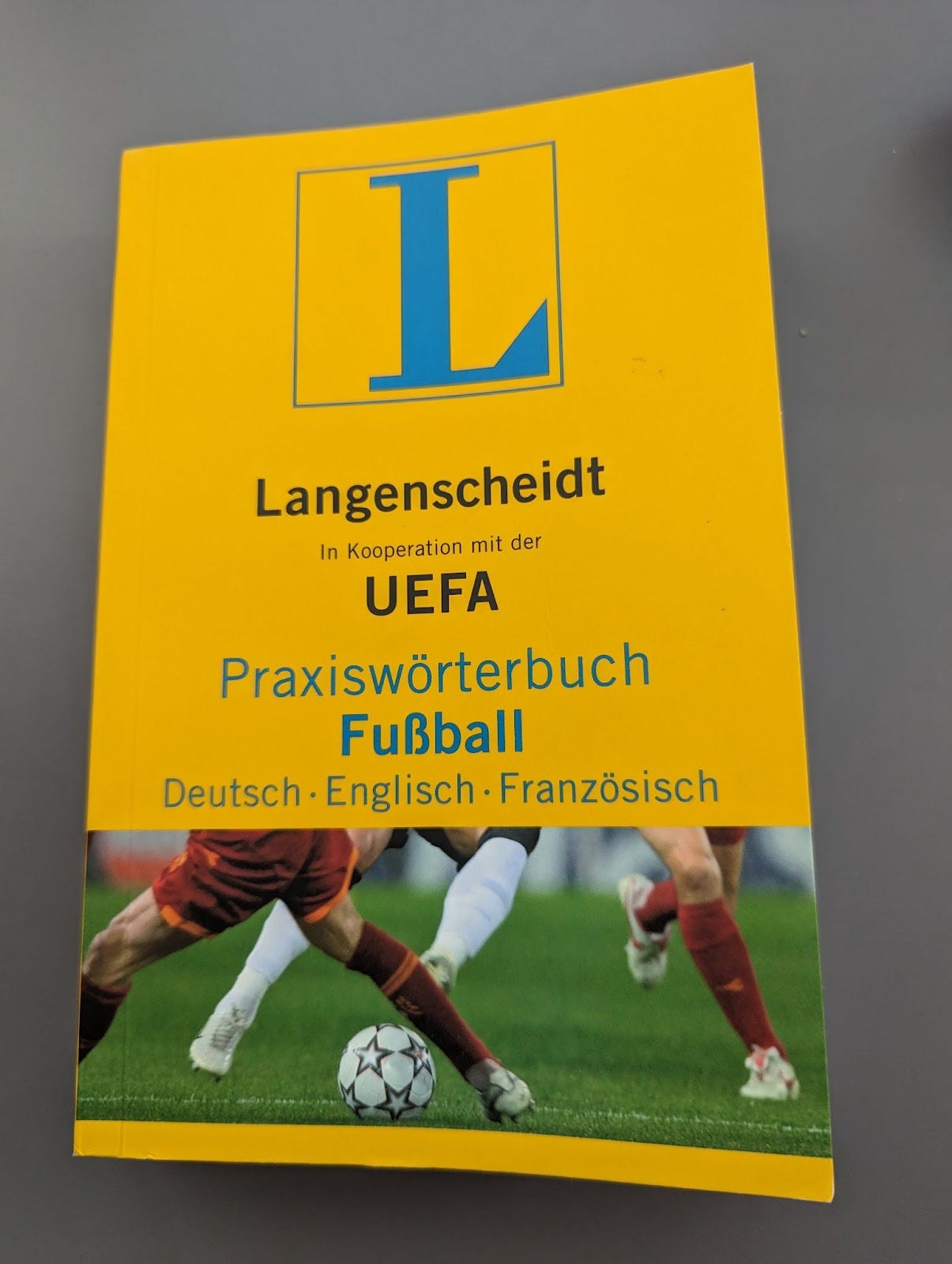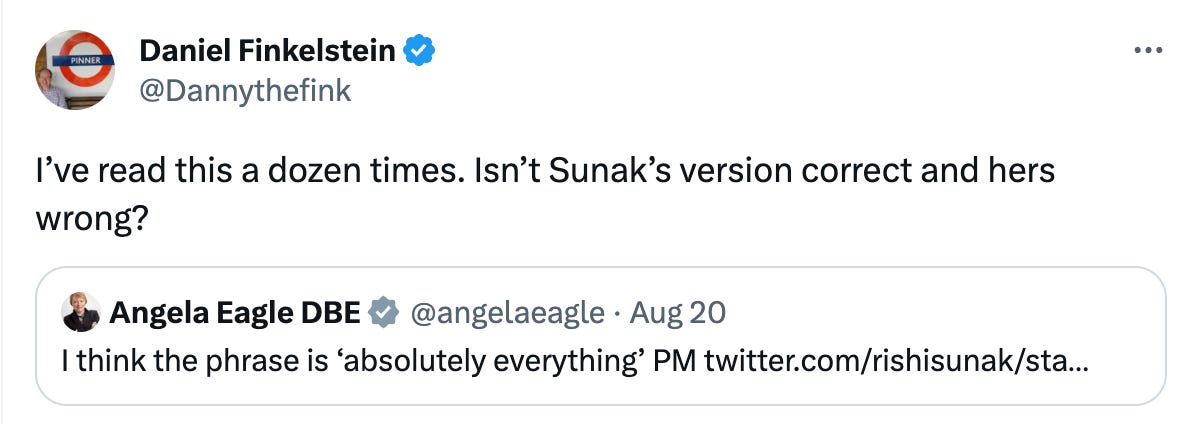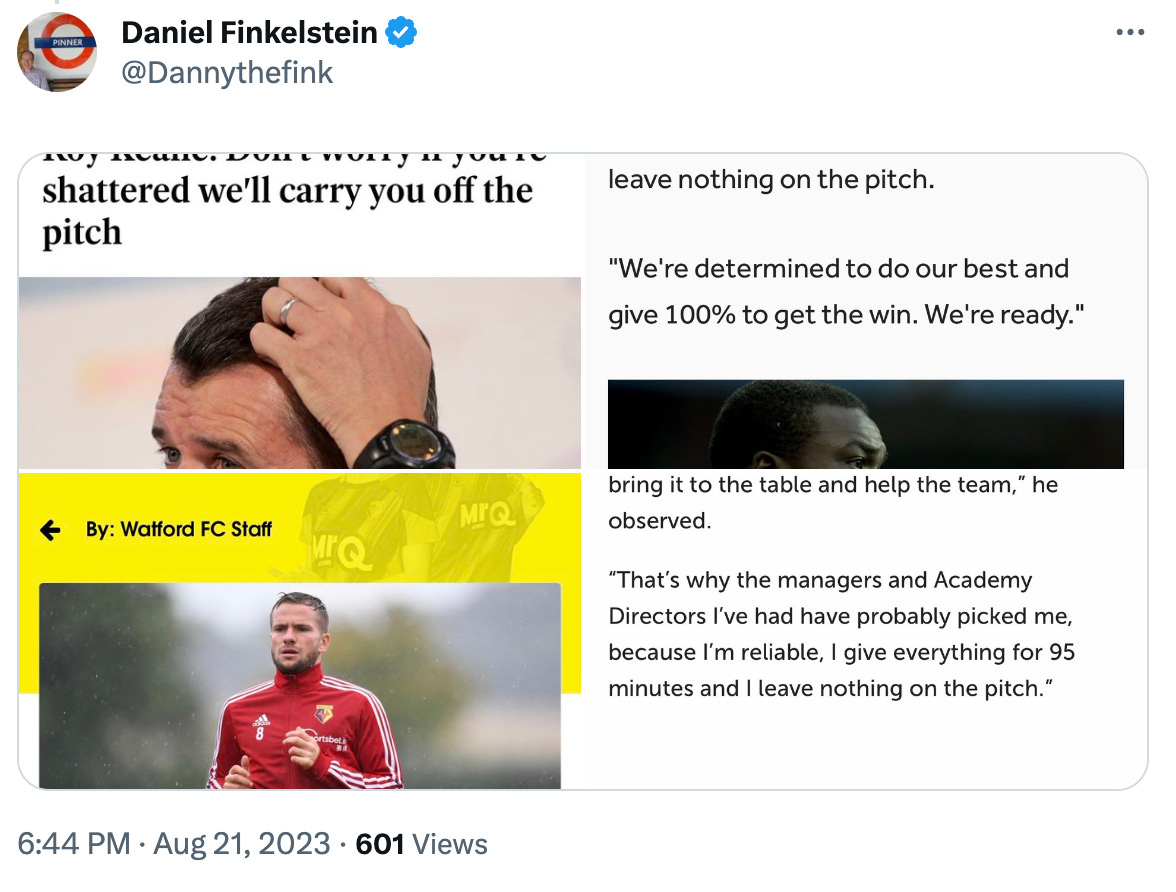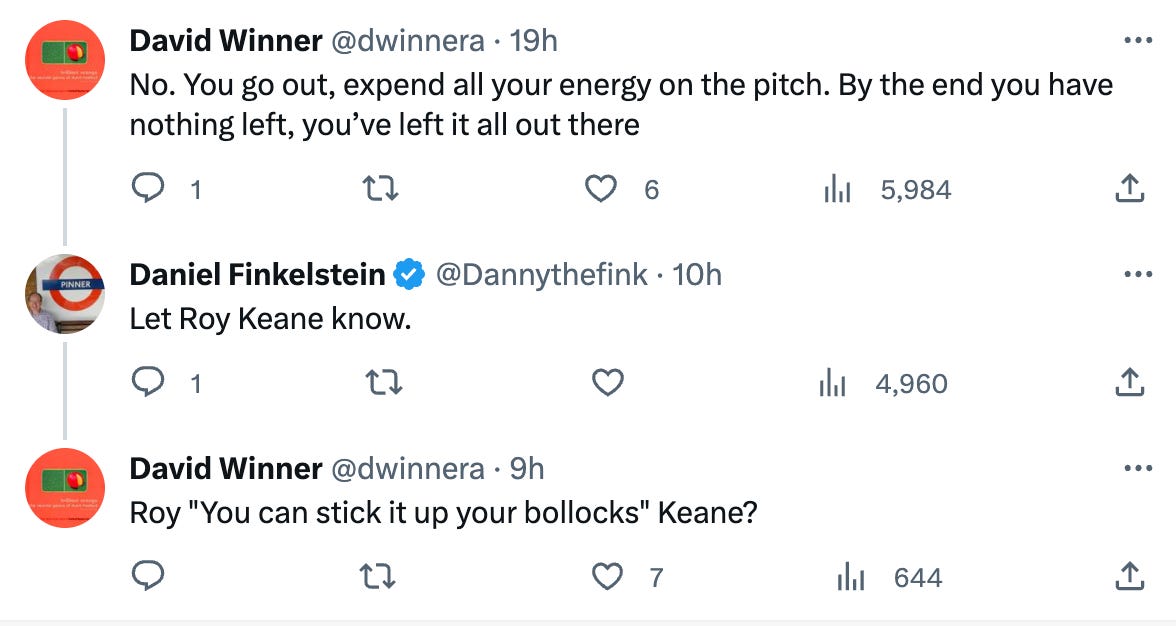A Substack of two halves
Or how Rishi Sunak demonstrated that football language is simultaneously clichéd and nuanced. Plus usual music bits and a brief Lionesses reflection.
Welcome to this week’s Scher Drops. I promise that, having weighed in on Rishi Sunak’s PR efforts last week, I absolutely did not intend to have another pop this week. But a badly worded tweet (post? X post? Xst? Not sure Musk has thought this through…) has forced my hand.
If you’re already bored of me going on about Sunak and/or football, I suggest you skip to the music section. And then skip the next section too. Don’t say I don’t give you due warning.
This week’s headings are:
Now saying
Now playing
Now afterthoughting
Now saying
Or Sunak and the language of football
Football speak is, depending on your point of view, somewhere between very idiomatic and painfully clichéd. It’s almost impossible to talk about the sport without falling back on the occasional set phrase, whether you’re a casual fan or a seasoned broadsheet journalist.
You’ll be pleased to learn this isn’t specific to English. Most languages seem to be littered with hackneyed soccer sayings. I even have a three-way, UEFA-endorsed football dictionary to help traverse the vagaries of international football dialogue.
German, for example, has a comparably broad selection of well-worn expressions. Anyone who has had the misfortune of working with me has probably heard me go on about ‘nach dem Spiel ist vor dem Spiel’ - literally ‘after the game is before the game’, i.e. as soon as you finish a match, it’s time to focus on the next one. I guess our nearest equivalent is something like ‘taking it one game at a time’ with a sprinkling of ‘you’re only as good as your last match’. Superb minimalistic, logical German language.
Despite this seemingly superficial nature, at the end of the day, going two-footed into football chat in any language without a decent grasp of its nuances is a potential banana skin.
Which brings us to our dear Prime Minister. Specifically, his tweet following England’s defeat to Spain in Sunday’s World Cup final.
Non-aficionados may not immediately recognise any glaring error but I think the majority of fans would agree that you typically talk about ‘leaving absolutely everything’ out on the pitch.
Of course, this being Twitter, an argument ensued between those mocking Sunak and those defending him. It dragged in a veritable who’s who of British public life. And Alastair Campbell.
We saw a two-pronged, lightning fast counter-attack from Sunak’s right-wingers (sorry): isn’t this actually a valid phrase? And you know what he means, so why nitpick unless you are doing so in bad faith?
Lord Danny Finkelstein (Conservative) went all in on the former, calling out Dame Angela Eagle MP (Labour) and going to the lengths of digging up other ‘leaving nothing out there’ quotes from footballers.
I’m not convinced finding a very occasional quote from a footballer, often when they’ve had a microphone shoved in their face straight after a match, quite proves what Finkelstein seems to think it does. As renowned football author David Winner pointed out more pithily.
Given Finkelstein is also part of the current Chelsea board (a byword for mindless spending whose circa billion pound transfer outlay is currently yielding around a point per £22m), and endorsed Todd Boehly’s takeover with the immortal phrase “these are smart guys, who don’t just have the money to invest, they know how to use it…It’s proper Chels”, maybe we can discount his views. Although to be fair, mindless transfer spending is pretty Chelsea…
Returning to the latter defence of grasping meaning: yes clearly everyone knew what he meant. But surely the question that follows is why attempt (and fail) to use a phrase you clearly are unfamiliar with?
The obvious answer is the age-old political quest to co-opt football to improve image. A badly worded tweet certainly isn’t the most egregious example of the genre (David Cameron famously mixed up who he ‘supported’) but it does speak to an off-handishness about something that millions hold very dear.
You might even go as far as to read a hint of arrogance or desperation in Sunak’s pronouncement. Arrogance in that he could have opted for a more straightforward, less football-y phrase like ‘you gave your all’ but he (or his team) felt they could easily sound genuine (how hard can it be to talk like one of those football fans?) and came a cropper. Desperation in that it was a moment of national unity which he couldn’t really be a part of (unless, say, he had flown to watch the game…). That’s not to say football is inherently hostile to new fans, just those who suddenly turn up when it is expedient and try to look like they’ve been there the whole time (bringing us nicely back to Chelsea fans).
So I do think this mini-row illustrates that, despite the plethora of idioms available to bandwagon-jumping posers, it’s not actually that easy to cosplay being a football fan. Yes, the language of football is clichéd, but like any vernacular it has nuances and unspoken rules that bind fans together and serve to highlight johnny-come-latelys. It’s a language of two halves. And what a language it is, by the way.
Post-script: Reading this back I feel like I made one too many digs at Danny Finkelstein and ought to make clear I actually think he’s a great writer. But the Chelsea asides still stand. Obviously.
Now listening
Couple of new songs added to the August playlist this week.
First up, Fran Lobo, formerly of the wonderfully named Deep Throat Choir, has released her debut album Burning It Feels Like. She’s popped up in a couple of places recently, including the Guardian’s One to Watch and the New Cue Substack (who you’ll remember from ep 2 of Scher Drops), which led me to tucking into the album’s lead single, of the same name.
It’s ace. Don’t be put off by the slightly intimidating opening soundscape (I do instinctively tend to reach for my cynical hat at anything too ‘experimental’ sounding): it develops into an ambitious, immersive track that jumps between catchy piano riffs, close harmonies and minimalistic drum beats. Will report back on the full album once I’ve had a chance to have a proper listen but I’m excited to give it a go.
Secondly, for reasons I can’t fully explain, I am always slightly hesitant to gush forth about how much I love Fred Again.
It might be that he’s had some stick for making electronic music which is catchy but a bit too paint by numbers. His writing and producing credits are a veritable who’s who of pop, which is held up as confirmation of his formulaic approach. (A recent article claimed ‘Hating him feels like hating Nando’s or Instagram or the Premier League. You might loathe the idea of it, but the output is too consumable to deny.’)
Or perhaps it’s something to do with his well-to-do background, which has led him to be an occasional lightning rod in the debate around accessibility and nepotism in the music industry (from his Wikipedia: Frederick John Philip Gibson [...] is the son of King's Counsel barrister Charles Anthony Warneford Gibson and Mary Ann Frances Morgan [...] Aged 16, Gibson joined an a cappella group at Brian Eno's studio in London, who was his family's neighbour at the time.)
But regardless of any connections and sniffy asides about the nature of his output, I think he makes brilliant music. His three Actual Life albums (particularly 2 and 3) are among my most played in the last few years. Despite accusations of genericism, to my ears they have a sound that is pretty unique and one which is increasingly imitated by other producers.
All of which is my typically long-winded way of saying he has a new single out, adore u, which has made it onto the playlist. It features the unique voice of Nigerian singer Obongjayar (known to fans of Little Simz for his appearance on her 2021 Sometimes I Might be Introvert album but absolutely worth checking out for his solo stuff - Never Change is a cracking song).
adore u is very much in Fred Again’s wheelhouse: uplifting, trippy, pop-tinged dance music. And, as you’d probably expect me to say after the previous 300 words or so, I really like it.
Now afterthoughting
This is intended as an afterthought in the very best possible sense.
You know something has genuinely made the move from niche to mainstream when the amount of comment around that move begins to die down and ceases to be a topic in and of itself.
I think we’re pretty much there with (international) women’s football.
Yes, there was plenty of discussion around the World Cup final about how the women’s game has grown and (rightly) reflecting on the enforced years it spent in the relative wilderness. But look at the numbers watching on TV (peaking at 15m in the UK, only surpassed this year by the Coronation). Look at the lack of previously prominent ‘it’s not proper football’ voices. And, from a personal perspective, just look at the fact that among friends and family the ‘will you be watching the match?’ question now has a universal ‘where’ prefix.
This is not to make any misplaced claims that the women’s game is in rude health the world over or suggest resting on laurels. But, in terms of cultural shift, I think we can safely say that it has made the mainstream leap. And this leap is now an afterthought in the head of a random bloke writing a Substack, not a topic for discussion. As it should be.
Of course, while the disappointment of Sunday morning was achingly familiar for England fans, it follows an actual bonafide tournament win at least year’s Euros. And the country can look forward to further major tournaments in 2024, 2025, 2026, 2027…
Plus on Sunday at least we had Katarina Johnson-Thompson to save the day in the World Athletics Championships.
Fin
As promised, even more sport heavy than normal this week, for which you will be unsurprised to learn I make no apologies. And as I say, I didn’t intend to feature Sunak two weeks on the trot but if he will ill-advisedly wade into football…
Hope you enjoyed. As ever, usual implorations to like, subscribe, share, comment, enquire as to further German football sayings (Der Ball ist rund), offer me a lucrative writing contract etc.
Until next time.






